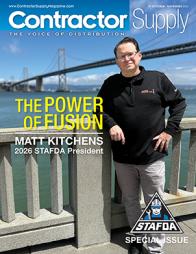PTI announces afforts to augment durability of post-tensioned bridges and other structures
Post-Tensioning Institute issues updated Specifications and Certification programs announced in response to feedback from the bridge industry.
The Post-Tensioning Institute (PTI) announced yesterday during a press conference at the World of Concrete current and future initiatives to help augment durability of post-tensioned concrete bridges and other structures.
“Concrete bridges that use post-tensioning are superior in strength, durability, low maintenance needs, and design flexibility,” said Miroslav Vejvoda, P.E., Managing Director of PTI. “The Institute provides quality standards, certification programs, and guidance to the industry for building successful post-tensioned bridges and other structures with the goal of maintaining its position as an expert resource for everything related to post-tensioning.”
In response to feedback from the industry, PTI is currently working on several products and services to meet the growing demands of owners, contractors, DOT entities, and others who wish to design and build post-tensioned concrete structures.
First, PTI is currently working alongside the American Segmental Bridge Institute (ASBI) to publish the second edition of “Specification for Multistrand and Grouted Post-Tensioning,” expected to be released in March. This state-of-the-art multistrand and grouted PT specification provides technical information for industry stakeholders as well as rules for the contractor regarding materials, installation, stressing, and grouting. The updated publication will include added commentary and new information on PT anchorage testing, duct specifications, and other updates.
Second, PTI will be publishing the fourth edition in March of “Specification for Grouting of Post-Tensioned Structures.” This comprehensive grouting specification provides information on grout materials, engineered grout, testing, and grouting procedures. The updated edition will include new requirements on material certification, robustness testing, and wet density testing for each tendon.
The seventh edition of the third relevant publication, “Recommendations for Stay Cable Design, Testing, and Installation” was published in Oct. 2018 and provides updated information on saddle testing provisions, fire resistance qualification testing, and vibration control system requirements.
The Institute also announced updates to its certification program offerings.
Thousands of field personnel have been certified through the ‘Level 1 & 2 Multistrand and Grouted PT Specialist’ PTI certification program. This comprehensive three-day class includes a field demo portion and instructs attendees on various topics such as PT basics, tendon protection levels, PT systems and components, materials and testing, installation, stressing and safety, grout testing and grouting procedures, contract documents, and troubleshooting. This certification has been found beneficial for major bridge projects, giving all involved the opportunity to review all aspects of the post-tensioning on their project. PTI is offering seven scheduled workshops of this type in various geographic locations in 2019. Special Request workshops are also offered.
New in 2019 is PTI’s ‘Multistrand and Grouted PT Inspector’ field personnel certification program. Attendees of the three-day workshop will learn about all aspects of materials, installation, stressing, and grouting. They will learn to apply that knowledge on inspection of all installation stages of post-tensioning, including finishing, documentation, and record keeping. Also presented will be checklists of inspection items, and in-depth class discussions will allow participants to fully understand the importance of competent inspection. PTI is offering six scheduled workshops of this type in various geographic locations in 2019. Special Request workshops are also available.
Also launching in 2019 will be the PTI ‘Level 3 Unbonded PT Repair, Rehabilitation, and Strengthening’ certification program. This program is for post-tensioning used in buildings and will offer guidance on evaluation methods, safety, repair techniques, and will review case studies for class discussion.
Later in 2019, PTI will be launching its ‘PT System Qualification Testing and Certification’ program. The certified PT Systems meeting the qualification testing criteria will be on the PTI website, accessible for the owners, designers, and other, with different access levels. The program will operate in accordance with the “ANSI Quality Management System & Technical Manual.” This program is expected to reduce DOT costs by shifting the approval process to PTI and PTS costs due to a centralized qualification testing.
“PTI continues to thrive thanks to its robust and diverse committee member community that volunteers countless hours to be sure PTI responds to the needs and feedback of the industry,” said Tony Johnson, P.E., PTI Executive Director. “As a leader of the industry, PTI is committed to continuing to innovate and provide excellent resources to anyone who desires to construct with post-tensioning.”
More information about PTI products and services can be found at www.Post-Tensioning.org.
















